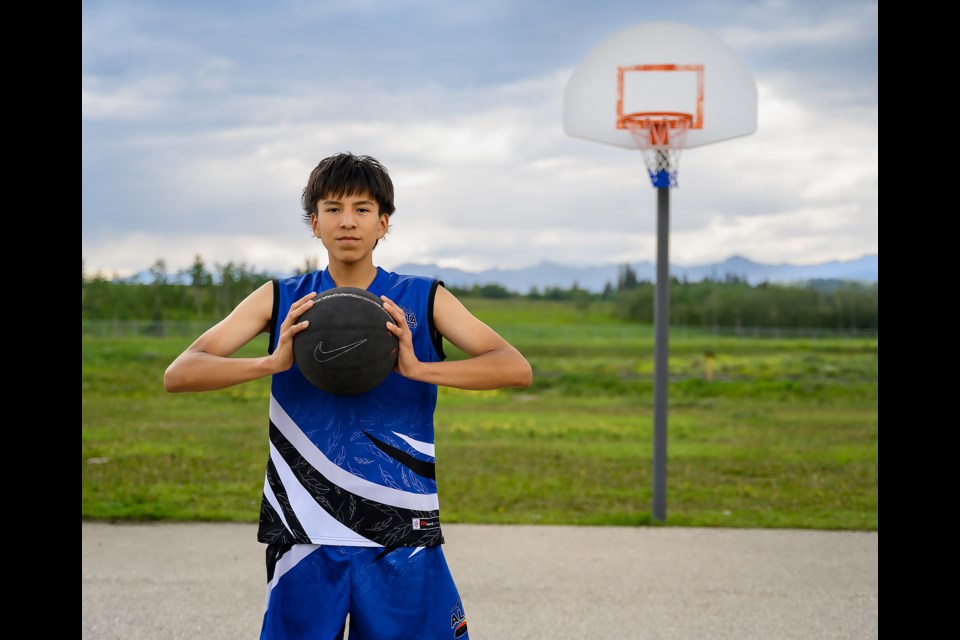HALIFAX, N.S. – In four years, Nikkita Beaver-Ear, Jonah Chiniquay, and other Îyârhe Nakoda First Nation athletes with their eyes on the next rendition of the North American Indigenous Games (NAIG) will be playing for the home team as the event makes its grand return to the province where it all started.
Beaver-Ear, 15, and Chiniquay, who celebrated his 16th birthday after the event, competed for Team Alberta at the games in Halifax last week (July 15-23). While neither finished with the result they may have set out for, the chance to compete again is within reach with the multi-sport games coming to Calgary in 2027.
“It will make the Games a lot easier to get to for a lot of kids I know,” said Chiniquay, who played point guard on the U16 boys’ basketball team. “I think it will be a lot more entertaining because I know a lot of kids in Alberta that are way better than I was at their age. It’ll be pretty exciting to get to see them compete at a higher level.”
Chiniquay said the U16 team got off to a rough start but was finding its stride by the end of preliminaries at the games in Halifax.
The boys’ team finished last in its preliminary pool at the games and did not progress to the elimination round and subsequent finals. On July 17, the team lost 72-60 to the Eastern Door and the North – the team representing Quebec First Nations and Inuit; on July 18, it lost 72-67 to Team B.C., and on July 19, it lost by a single point to Team Haudenosaunee 74-73.
“Our first game was rocky – we weren’t really used to playing with each other yet so there were lots of turnovers and mistakes,” he said. “We managed to get it back up to within one point, but it just broke off toward the end.”
Chiniquay said he feels he played his best game against B.C., where he stacked up 17 points, including a three-pointer to set the tone in the first quarter.
“It felt a lot better than the first game. I had a better sense of the team and some of the competitors, so I knew what kind of intensity I needed to bring,” he said. “I really tried to show up for my team, just having a good attitude and showing people not to be scared of shooting.”
By the end of the week-long tournament, Team Wisconsin took gold, Minnesota took silver and the Eastern Door and the North took bronze. The Alberta U19 boys’ team won gold in its category.
Jordie Mark, Chiniquay’s father, said the experience of watching his son compete with about 5,000 other young Indigenous athletes, celebrating sport, culture and tradition, was unforgettable, but also nostalgic.
At 16 years old, Mark also competed at the games for Alberta’s U16 basketball team in 2006 in Denver.
“This one was pretty cool to see,” said Mark. “I got to watch my son represent not just Alberta, but Mînî Thnî and Stoney Nakoda. We faced some tough competition and he played his heart out, and I think his team saw that.”
The NAIG were first held in Edmonton in 1990. The Games are the largest multi-sport and cultural event for Indigenous youth in North America. This year, athletes competed in 16 different sports, including traditional archery, lacrosse and canoe/kayaking.
Beaver-Ear, who qualified eighth overall in U16 girls compound 3D archery over two days of competition (July 18-19), was bumped out of the competition 42-25 in the fifth elimination round, on July 20, against Team Nova Scotia’s Angelina Taylor.
After a quarterfinal, semifinal, final and gold medal match, Lyrik Alexi Shelby Albert of Team Saskatchewan took first place, Team Manitoba’s Wassayah Munro-Soldier took second and B.C.’s Hadley Williams took third.
In the sport’s U16 boys category, Team Alberta’s Tayden Patrick James Shott of Fort McKay First Nation, won gold.
Team Alberta finished fourth place on the medal table at the games, winning 26 gold medals, 27 silver and 28 bronze, spanning seven different sports, including athletics, swimming, wrestling, archery, basketball, soccer and volleyball.
The Local Journalism Initiative is funded by the Government of Canada. The position covers Îyârhe (Stoney) Nakoda First Nation and Kananaskis Country.




